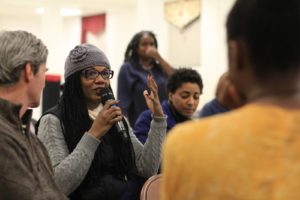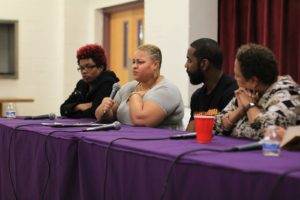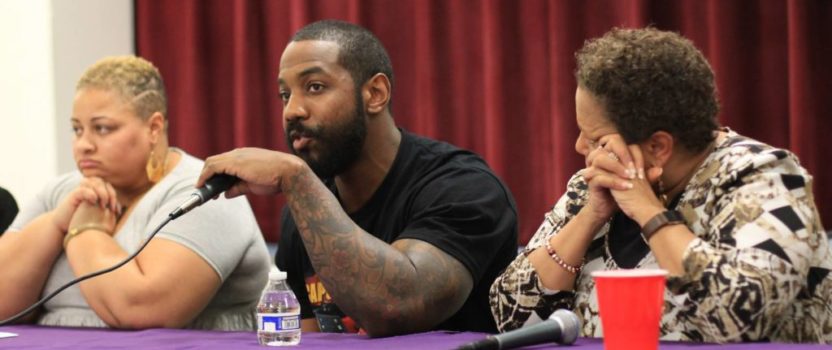#MeToo in Ward 8: Triggered Documentary Screening & Community Discussion
Earlier this month, our policy team co-hosted a community event in Ward 8 with Grassroots DC to talk about street harassment, gendered violence, and ways we can make change in our community: starting with the Street Harassment Prevention Act (affectionately called SHPA).
The event included a screening of Triggered: Street Harassment and Rape Culture in DC’s Ward 8, which was produced by Liane Scott, president of Grassroots DC. Scott’s film documents the events that took place at the Reclaiming Our Bodies speakout last year. The speakout was prompted by the harassment of a teenage girl and her mother when they were in line for a free meal at a community food table. Instead of getting a meal, they got an earful about how the girl’s attire—a t-shirt, tied at the waist, and leggings—justified harassment and threats of violence by men in the community, including the men serving the food. (SO not ok.)
After the screening, community leaders, including our own Rethink Masculinity co-director Stephen Hicks, took part in a panel discussion on street harassment in the District—and how it’s not about what people are wearing, it’s about a harasser exerting power and control. Stephen Hicks also shared that people, especially men, learn toxic scripts about how to treat themselves and women. He reiterated that people need to un-learn these scripts about masculinity–something CASS’s program on Rethink Masculinity is proud to do.
As panelist Dr. Pamela Brewer, a clinical social worker and therapist said, “None of this is about what you are wearing. All of this is about power.”

Panelists also discussed how race and racism are inextricably linked to street harassment, and how men need to be part of the movement to end gendered violence. Aja Taylor, affordable housing advocate director at Bread for the City and an anti-harassment activist with Reclaiming Our Bodies DC, called attention to the double burden that black women face each day, experiencing harassment due to both patriarchy and white supremacy. Her words were affirmed by an audience member, who added that “Black women have not had an outlet to talk about the violence [they] have faced.”
Hicks also described how our Rethink Masculinity program pushes for societal change: participants are pushed to see the women in their lives as whole beings. Men are too often socialized to see women and queer folks as less than whole beings, as only conduits for pleasure. Panelist Schyla Pondexter-Moore, the mother of the girl who was harassed in the original incident, lifted up the importance of listening to victims of sexual harassment. “If you want to solve the problem, you have to go to the girl and ask her, what would you like to have done as a victim?”

Tony Lewis, Jr., a DC native and author of the book Slugg: A Boy’s Life in the Age of Mass Incarceration, added, “As men, we may be violating women and we may not even be aware. This [harassment at the community food table] is not an isolated issue of trauma and pain.” Panelist Aja Taylor affirmed the prevalence of trauma in black communities and its role in perpetuating violence: “Trauma [from harassment, from racism] is unnatural. It happens to everyone, but it’s unnatural, and people expect you to have a natural response to something unnatural.”
This event was just the beginning of the very necessary yet often-painful conversation about gendered street harassment.
We need you to help build a campaign for DC to invest in community-based solutions to street harassment. Volunteers help mobilize supporters, engage with DC Council, and bridge arts and activism. Email leah@collectiveactiondc.org to join.

